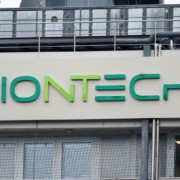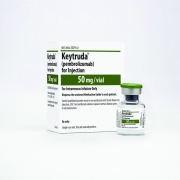Germany’s BioNTech on November 19 was awarded fast track designation by the U.S. Food and Drug Administration for the speedy review of a novel skin cancer therapy, which is based on RNA technology similar to the one that underpins the company’s Covid-19 vaccine.
The U.S. Food and Drug Administration approved an expanded label for Merck’s anti-PD-1 therapy Keytruda as monotherapy for the treatment of patients with locally advanced cutaneous squamous cell carcinoma (cSCC) that is not curable by surgery or radiation.
Regeneron Pharmaceuticals and Sanofi announced that the European Commission approved the PD-1 inhibitor Libtayo (cemiplimab) for the first-line treatment of adults with non-small cell lung cancer (NSCLC) whose tumor cells have ≥50% PD-L1 expression and no EGFR, ALK or ROS1 aberrations. The EC also approved Libtayo in advanced basal cell carcinoma (BCC).
UK Variant Not as Lethal as Originally Reported
Antibody-Drug Conjugates (ADCs), Breast Cancer, Brown Fat Cells, Cancer Immunology Research, COVID-19 Deaths, COVID-19 Variant B.1.1.7, Covid-19 Variants, Fat Cells, Harvard Medical School, Hospitalized COVID-19 Patients, Immune Cells, Lancet Infectious Diseases, Lancet Public Health, Massachusetts General Hospital, MD Anderson Cancer Center, Osteosarcoma, SARS-CoV-2 virus, Skin Cancer, T-Cells, The Ohio State University Wexner Medical Center, Tumors, WuhanA new study by researchers at the University College London (UCL) published in Lancet Infectious Diseases finds that although the U.K. variant of SARS-CoV-2 known as B.1.1.7 is more transmissible than the wild-type, original Wuhan strain, it is likely not more deadly.
While “social distancing” may prevent us from catching the coronavirus, “Solar Distancing,” a new animated spot launched by FCB Health Network company AREA 23 on behalf of Mollie’s Fund, shows that no amount of distance from the sun can keep us safe from melanoma.
Swiss drugmaker Novartis said the company’s investigational spartalizumab immuno-oncology drug mixed with the approved medicines Tafinlar and Mekinist failed in a late-stage trial for a type of advanced skin cancer.
The U.S. Food and Drug Administration approved Merck’s anti-PD-1 therapy Keytruda as monotherapy for the treatment of patients with recurrent or metastatic cutaneous squamous cell carcinoma (cSCC) that is not curable by surgery or radiation.
FDA Action Alert
Acromegaly, Blockbusters, Checkpoint Inhibitors, Clinical Trials, Cutaneous Squamous Cell Carcinoma (CSCC), Diffuse Large B-Cell Lymphoma (DLBCL), Dravet syndrome, FDA/Regulatory, NDA Resubmission, New Drug Applications, Non-alcoholic steatohepatitis (NASH), Postoperative Pain, R&D, Seizures, Supplemental Biologics License Application, Supplemental New Drug Application (sNDA), TherapeuticsWrapping up June and ahead of the July 4 holiday, the U.S. Food and Drug Administration has a busy two-week period coming up for drug approval reviews.
Paris-based Sanofi and Tarrytown, New York-based Regeneron Pharmaceuticals announced topline data for the companies’ pivotal Phase II trial of the PD-1 checkpoint inhibitor Libtayo (cemiplimab) in advanced basal cell carcinoma patients that had progressed on or could not tolerate previous hedgehog pathway inhibitor therapies.
FDA Rejects Merck’s 6-Week Dosing Schedule for Keytruda
Blockbusters, Checkpoint Inhibitors, Classical Hodgkin Lymphoma, Complete Response Letter, Dosing, FDA, FDA/Regulatory, Gastric Cancer, Hepatocellular Carcinoma, Melanoma, Merkel cell carcinoma, Primary Mediastinal B-Cell Lymphoma (PMBCL), Supplemental Biologics License Application (sBLA)Merck’s Keytruda (pembrolizumab) received a rejection from the U.S. Food and Drug Administration for each of six supplemental Biologics License Applications to update the dosing frequency of the checkpoint inhibitor to include every-six-weeks administration.









